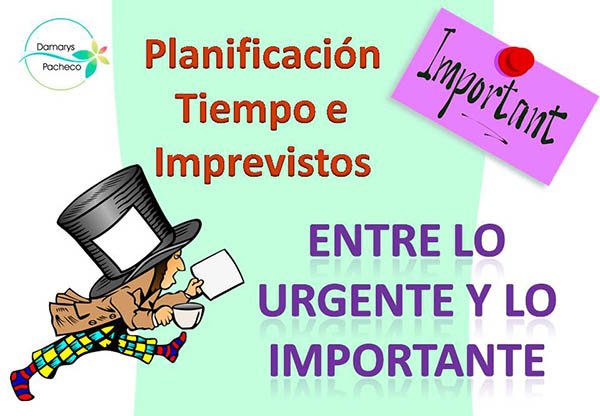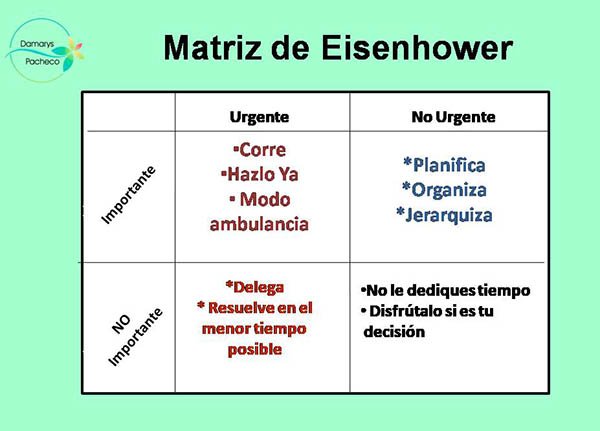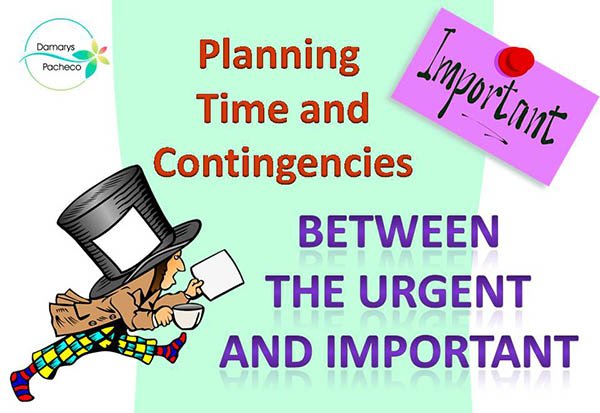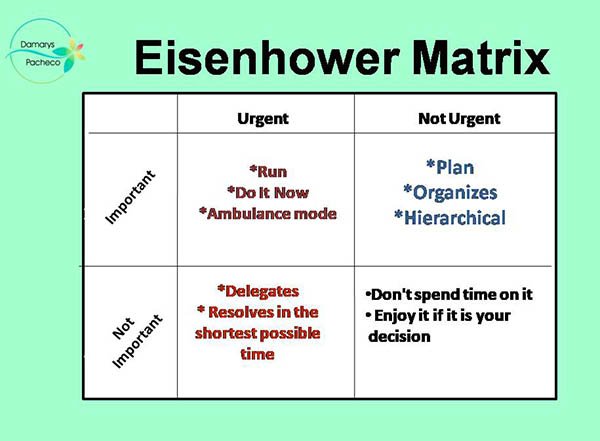Planificación, Tiempo e Imprevistos|Planning, Time and Unforeseen Events

El tiempo se ha descrito como uno de los valores más preciado que tenemos, en principio todos disponemos de la misma cantidad de tiempo, aunque no escapa de las percepciones de cada uno, con lo cual validamos la premisa de Einstein al declararlo relativo, de allí que en ocasiones sentimos que hay personas que tienen más tiempo que uno o que hacen milagros con su tiempo.
Más allá de cualquier percepción, el asunto del manejo del tiempo, para que nos rinda, tiene que ver con dos conceptos muy prácticos y conocidos: Organización y planificación. Como siempre, están las letricas pequeñas que nos dicen “ciertas condiciones aplican” porque la planificación tiene que ser tan ajustada que nos haga sentir que lo realizado en esas horas valió el esfuerzo, obtuvimos lo que nos propusimos, al mismo tiempo tiene que ser lo suficientemente flexible para sentir que no todo es trabajo e insertar aquellos eventos que llamamos imprevisto, sin que eso represente un caos.
Y hablando de los imprevistos, en la primera parte de este tema No dejes que el tiempo se te escape||Don't let time get away from you la amiga @rosahidalgo en su comentario pregunta sobre algunas buenas prácticas para manejar los imprevistos. Decidí hacer este post para compartir con ustedes una práctica que me ha sido de gran utilidad.
Particularmente trato de evaluar rápidamente el imprevisto y determinar si se ubica en el cuadrante urgente- importante. Cuando hablo de cuadrante hago referencia a una excelente técnica creada por Eisenhower llamada matriz de gestión de tiempo. Conversemos sobre ella.

Lo que más valoro de esta técnica es su aplicabilidad en lo personal, laboral y por supuesto en nuestro hacer como emprendedores, cuando uno la internaliza y la hace hábito, cualquier eventualidad que se presente la metes en el cuadrante correspondiente y actúas en consecuencia.
Sí, ya sé, suena mecánico y de hecho lo es, sin embargo, cuando nos habituamos a clasificar los eventos de esta manera es mucho el tiempo que ahorramos, que es el tema central de esta serie, además que podemos tener respuestas más acertadas y efectivas. Comentemos cada cuadrante:

A.- Urgente-importante. Si la eventualidad entra en esta categoría no hay de otra, Hay que dejar de hacer lo que estamos haciendo y salir corriendo a resolverlo porque en nuestra escala de valoración esa eventualidad lo amerita, ejemplos: una emergencia familiar, una solicitud de un cliente que representa para nosotros una oportunidad única a tal punto que amerita romper con la planificación establecida y darle prioridad a ella.
B.- Importante-no urgente. El imprevisto llegó y determinamos que es importante, pero no urgente, por lo que puede pasar a la lista de nuestra planificación, ubicándola como prioridad por resolver sin necesidad de salir corriendo a resolver la situación.
C.- No importante-Urgente. Acá es bueno aclarar que la categoría “no importante” no quiere decir que carezca de valor, solo que posiblemente haya otra persona que puede resolver la situación que se presentó, tiene disponibilidad para hacernos el favor o en el medio laboral, si está en nuestras manos, podemos delegar esa urgencia. En todo caso, lo urgente no importante, no nos coloca en modo ambulancia, por lo que posiblemente podemos terminar lo que teníamos previsto y luego atender esta urgencia.
D.- No importante-no urgente. De pronto te preguntas ¿Pero quién hace algo que no es importante ni urgente? Todos en algún momento, quizás más de los que reconocemos, hacemos cosas que entran en este cuadrante, por ejemplo, los roba tiempos internos y externos, el enfocarnos en detalles perfeccionistas que nos paralizan o dedicar nuestro tiempo a tareas que no nos reportan nada positivo para alcanzar nuestras metas, como puede ser estar trabajando con el teléfono al lado y estar viéndolo constantemente.
Me parece que los imprevistos merodean con constancia a nuestro alrededor, unos pueden ser muy sencillos y otros de mayor relevancia. Tener una guía que nos permita evaluarlos para darle el lugar que le corresponden, nos ayuda a manejar mejor nuestro tiempo y que al estar unido a la planificación diaria, cuando ocurren y se solventan, retomar la actividad no requiere de mucho protocolo, es parte del continuum del día a día.

In English

Time has been described as one of the most precious values we have, in principle we all have the same amount of time, although it does not escape the perceptions of each one, which validates Einstein's premise when declaring it relative, hence sometimes we feel that there are people who have more time than us or who do miracles with their time.
Beyond any perception, the issue of time management has to do with two very practical and well-known concepts: organization and planning. As always, there are the small letters that tell us "certain conditions apply" because the planning has to be so tight that it makes us feel that what was done in those hours was worth the effort, we got what we set out to do, at the same time it has to be flexible enough to feel that not everything is work and to insert those events that we call unforeseen, without that representing chaos.
And speaking of unforeseen events, in the first part of this topic No dejes que el tiempo se te escape||Don't let time get away from you friend @rosahidalgo in her commentary asks about some good practices to manage unforeseen events. I decided to make this post to share with you a practice that has been very useful for me.
In particular, I try to quickly evaluate the unforeseen event and determine if it is located in the urgent-important quadrant. When I talk about quadrant I refer to an excellent technique created by Eisenhower called time management matrix. Let's talk about it.

What I value most about this technique is its applicability in the personal, work and of course in our work as entrepreneurs, when you internalize it and make it a habit, any eventuality that arises you put it in the corresponding quadrant and act accordingly.
Yes, I know, it sounds mechanical and indeed it is, however, when we get used to classify the events in this way is much time we save, which is the focus of this series, plus we can have more accurate and effective responses. Let's comment on each quadrant:

A.- Urgent-important. If the eventuality falls into this category there is no other way, we must stop what we are doing and run to solve it because in our scale of assessment that eventuality deserves it, examples: a family emergency, a request from a client that represents for us a unique opportunity to such an extent that it deserves to break with the established planning and give priority to it.
B.- Important-not urgent. The unforeseen event arrived and we determine that it is important, but not urgent, so it can go on the list of our planning, placing it as a priority to be resolved without the need to rush out to resolve the situation.
C.- Not important - Urgent. Here it is good to clarify that the category "not important" does not mean that it lacks value, only that possibly there is another person who can solve the situation that arose, has availability to do us the favor or in the work environment, if it is in our hands, we can delegate that urgency. In any case, the urgent non-important, does not put us in ambulance mode, so we can possibly finish what we had planned and then attend to this urgency.
D.- Not important-not urgent. Suddenly you ask yourself: But who does something that is neither important nor urgent? All of us at some point, perhaps more than we recognize, do things that fall into this quadrant, for example, internal and external time-stealing, focusing on perfectionist details that paralyze us or spending our time on tasks that do not bring us anything positive to achieve our goals, such as working with the phone next to us and constantly looking at it.
It seems to me that unforeseen events lurk constantly around us, some may be very simple and others of greater relevance. Having a guide that allows us to evaluate them and give them the place they deserve, helps us to better manage our time and, being linked to the daily planning, when they occur and are solved, resuming the activity does not require much protocol, it is part of the continuum of the day to day.



 @mosa71
@mosa71 @activandoandocp
@activandoandocp
Translated with www.DeepL.com/Translator (free version)
Fuente de imágenes: Portada: [1](Clker-Free-Vector-Images en Pixabay) - 2 - [3]Imagen de (mohamed_hassan en Pixabay)



MIS REDES SOCIALES





Be Entrepreneur



@damarysvibra me parece que aplicar esta propuesta nos va a servir a los que procrastinamos.
Mientras leía me di cuenta de que a veces invierto tiempo en lo que no es prioridad y por eso me agarran las mil de la noche trabajando.
Voy a comenzar a aplicarla
Gracias Por este aporte.
Las mil de las noche 😃😃😃😂😂. Aplícala y ve evaluando, luego me comentas como van tus resultados 👍. Feliz fin de semana.
Guardado el post para consulta constante hasta acabar de internalizar esa técnica, y acabar de ubicar inteligentemente cada evento en el cuadrante correspondiente. Gracias 🙏 @damarysvibra, muy oportuna para mí esta lectura, las no urgencias-no importantes nos llenan el día si no estamos alertas. Es así. Y el salir corriendo sin sentido también puede ocupar gran parte de tiempo y la energía. Un abrazo desde la Habana.
Hola @saraleo me alegro que la técnica te haya gustado, yo la conocí más como estrategia personal para bajarle el ritmo a mi vida y no hacer de los hechos una emergencia, lo que me ha dado muy buenos resultados.
Sigue, contacta y apóyanos en:
Saludos, gracias por el apoyo.
las no urgencias-no importantes es lo que llamamos en Venezuela apagar fuegos. Em eso se nos va la vida y no solucionamos los verdaderos ronblemas es por esta razón que hay que planificar.
Un abrazo @damarysvibra
Pensé en cuánto tiempo se puede perder en lo que es importante pero que se podría hacer más viable, como el tema de la gasolina, por ejemplo, cuyo problema impide resolver otras cosas urgentes. Cómo ha cambiado nuestra percepción de estos temas.
Saludos, amiga
Buena forma de organizarse, primero una agenda con claras actividades y horarios y luego la manera de manejarse en los imprevistos, evaluar la urgencia y la importancia. Gracias por tu respuesta @damarysvibra un gran abrazo
Time one of the wrong tool used in our society today and not fully maximising the time tool. Time management is key in life if you really want to go far
Saludos @damarysvibra, leyendo tu post recordé una frase que usaba mucho mi padre, siempre nos insistía en la importancia de aprovechar el tiempo, su eslogan era "priorizar lo que era realmente importante y urgente" al principio no entendía este planteamiento , con el paso de los años comprendí que lo te hace crecer y mejorar es lo que vale la pena y debes invertir tu tiempo y energía en ello, dejar de lado los caprichos como él decía y ver un poco más allá de lo que tus ojos pueden ver te ayudará a priorizar los objetivos y metas esenciales para tu proyecto de vida.
Feliz y bendecido día!
Excelente post, a veces tener tantas actividades pendiente en el día, es complicado